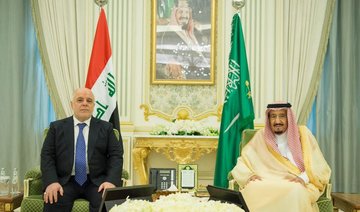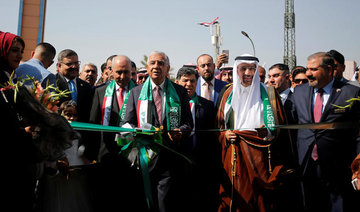RIYADH: King Salman and Iraqi Prime Minister Haider Al-Abadi jointly inaugurated the first high-profile meeting of the Saudi-Iraq Coordination Council (SICC) on Sunday, recalling the age-old ties of “fraternity, blood, history and destiny” between the Kingdom and Iraq. US top diplomat Rex Tillerson also attended the landmark meeting.
Addressing the inaugural meeting at Al-Yamamah Palace, King Salman said: “We are facing in our region serious challenges in the form of extremism, terrorism, as well as attempts to destabilize our countries … These attempts require our full attention,” said the king at the SICC, which has been convened to upgrade Saudi-Iraqi strategic ties and counter Iran’s regional influence.
“I look forward to the meetings of the SICC to move toward a broader and more welcoming horizon,” said the king, while welcoming Iraqi and American leaders and officials to the maiden meeting.
Referring to the stepped-up move of Baghdad to curb the menace of terrorism, King Salman said: “We congratulate our brothers on the achievements made in terms of eradicating and defeating terrorism … We reaffirm our support for the unity and stability of our brotherly country of Iraq,” said the king.
He also thanked Secretary of State Tillerson for attending the SICC meeting “which reflects the attention being paid by President Donald Trump and the US administration to the common interests between the US, the Kingdom and the Republic of Iraq.” The king said that the presence of Iraqi premier and US official is indicative of our “commitment to address all outstanding issues and differences.”

In his speech, Al-Abadi expressed happiness with “the growing cordial relations between the two brotherly countries.” He reaffirmed the need for stronger ties with the Kingdom, saying that “We (in Iraq) are open and we want to move away from the past.”
“The region cannot tolerate any further divisions,” said Al-Abadi, while renewing his call to stop “interference in the internal affairs of other states.”
Al-Abadi welcomed the wide-ranging talks within the framework of the SICC as an “important step toward enhancing relations.” Al-Abadi, while speaking at the SICC also reviewed and highlighted a number of issues and subjects related to cooperation and joint interests between the Kingdom and Iraq. The Iraqi premier stressed the importance of focusing on combating terrorism.
“We believe that our security, economy and interest must be formulated by joint action among the countries of the region,” said Al-Abadi, calling on Arab nations including the Kingdom to unify efforts to “start a new era of peace, stability and development.”
Speaking on this occasion, US Secretary of State Tillerson, while referring to the strategic ties between Riyadh and Baghdad, said that the newly created SICC “highlights the strength and breadth, as well as the great potential of the relationship between your countries.” He called the growing relationship between the two countries “vital to bolstering our collective security and prosperity.”
The SICC session was attended by a large number of high-ranking Saudi, American and Iraqi officials. Prominent among them were Minister of Foreign Affairs Adel Al-Jubeir; Minister of State and Cabinet Member Musaed bin Mohammed Al-Aiban; Minister of State and Cabinet Member Ibrahim Al-Assaf; Minister of Commerce and Investment Majed bin Abdullah Al-Qassabi; Minister of Environment, Water and Agriculture Abdulrahman Al-Fadhli; and Minister of Energy, Industry and Mineral Resources Khalid Al-Falih.
On the Iraqi side, the session was attended by Iraqi Minister of Foreign Affairs Ibrahim Al-Jaafari; Minister of Defense Irfan Al-Hayali; Minister of Planning Salman Al-Jumaili; Minister of Higher Education and Scientific Research Abdul Razzaq Al-Issa; Minister of Labor and Industry Mohammad Shiaa Al-Sudani; Minister of Agriculture Falah Hassan Zaidan; Minister of Transport Kazem Fanjan; and Minister of Culture Faryad Rawanduzi.






























